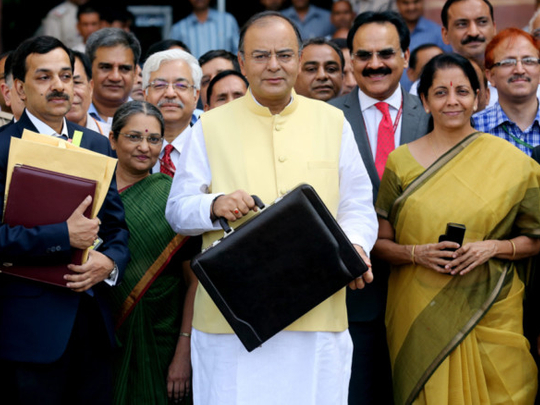
Dubai: Indian Finance Minister Arun Jaitley on Thursday unveiled a budget with a number of structural reform initiatives that seek to revive growth, vowing to lift economic growth to rates of 7-8 per cent by promoting manufacturing and infrastructure and overhauling populist subsidies.
Expectations had been high that the government would convert India’s strongest election mandate in 30 years into radical steps comparable to the 1991 market reforms that unleashed an era of high economic growth.
But constrained by a two-year spell of growth of less than 5 per cent, the government instead announced incremental steps to boost capital spending in Asia’s third largest economy and reassure foreign investors that they would get fair treatment.
Jaitley told lawmakers that he would uphold the fiscal deficit target inherited from the last government, despite expectations he would be forced to raise it due to weak revenues and high subsidy costs.
The overnment announced that it will launch a tax reform this year to unify India’s 29 federal states into a common market, a measure that economist say would boost revenue and at the same time make it easier to do business.
India’s 1.2 billion people were “exasperated” by the weak economy, Jaitley told lawmakers, vowing that the country would expand at an annual rate of 7-8 per cent within three to four years.
“We shall leave no stone unturned in creating a vibrant and strong India,” Jaitley. Investors have piled into Indian stocks on hopes that Modi’s leadership and mandate would break a logjam thwarting a host of reforms during the 10-year tenure of his predecessor Manmohan Singh, whose coalition government became increasingly divided.
But the measures announced by Jaitley fell short of some of the expectations flagged by brokerages and investment bankers, leading shares to fall to a two-and-a-half week low. Bonds rose on the promised fiscal prudence.
Tax relief
The finance minister said he proposed the tax exemption limit for individuals below 60 years at Rs. 250,000, subject to parliament’s approval, and Rs. 300,000 for senior citizens. Deductions allowed under various heads such as investments in insurance, pension and house rent are also proposed to be raised by Rs. 50,000 to Rs. 150,000.
Fiscal consolidation
The minister said given the state of the economy today, high inflation, low growth and moderate rise in tax collections, the fiscal deficit target of 4.1 per cent of India’s gross domestic product set by his predecessor P. Chidambaram was a “daunting” task.
“But I have decided to accept this target as a challenge,” he said, adding he will seek to further bring down the fiscal deficit to 3.6 per cent for the next fiscal and to 3 per cent in the year after.
He said the country cannot be made to suffer due to indecisiveness and populism and there was an urgent need to revive growth in manufacturing and infrastructure. “We will also examine proposals for more autonomy to banks.”
He indicated those reductions would involve overhauling expensive subsidies for food, fuel and fertiliser that cost India’s government some $40 billion a year. He gave no details other than saying the subsidies would be “more targeted.”
Government overspending will be brought down dramatically in the next three years, with the fiscal deficit reduced to 3% in 2016/17, Jaitley said.
He projected the fiscal deficit at 3.6% of the gross domestic product (GDP) in 2015/16, accepting the fiscal deficit target of 4.1% in the current fiscal. The finance minister also said the government aimed at sustained growth of 7-8% in the next 3-4 years, as the Economic Survey projected 5.4-5.9% GDP growth in fiscal 2014-15.
Boost to investments
Jaitley said the government could not rely only on spending cuts to reduce the budget deficit and should also work to spur economic growth back to 7-8 per cent, which would result in higher tax revenue.
He said that a revival of manufacturing and building of new infrastructure are ways to provide jobs. He announced programs to promote investment in factories, roads and ports.
Jaitley also announced that limits on foreign investment in the defence and insurance industries would be raised to 49 per cent from 26 per cent.
“The people of India have decidedly voted for change,” Jaitley said in opening his speech to parliament.
Modi’s Hindu nationalist Bharatiya Janata Party swept to power in May after the most decisive election victory India has witnessed in three decades, ousting the long-dominant Congress party.
The finance minister said the possibility of a poor monsoon and the Iraq crisis were key challenges with a bearing on both government finances and inflation. But he said the situation will be monitored closely to initiate immediate corrective steps.
“Financial stability is the foundation of our recovery.”
Widening tax net
Jaitley also promised early introduction of the pan-India goods and services tax, while assuring the domestic and global investment community of predictability in the tax regime to restore confidence about the country’s prospects. He promised more clarity on the goods and services tax (GST) before the year end. The GST is seen as the single-biggest fiscal reform in the country — it aims to widen the tax base, improve tax compliance and reduce transaction costs of businesses. It can add as much as 2 per cent of GDP to India’s economy.












